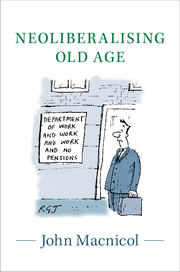2 - Old age in the past
Published online by Cambridge University Press: 05 November 2015
Summary
The status of old age as a protected stage of life was associated with the long period of industrial capitalism from the 1880s to the 1970s. Often termed ‘organised’ or ‘fordist’ capitalism, it is said to have been characterised by fulltime, job-for-life, blue-collar male industrial employment and low employment rates of married women. This is broadly correct, although it must be remembered that within this time-span there were long periods of recession, mass unemployment and job insecurity. In many ways, fordist capitalism was really only successful from 1945 to 1975. However, in general the period from the 1880s to the 1970s was one in which retirement (both mandatory and culturally sanctioned) was used to dispense with the services of employees who were deemed – by the use of a simple age proxy – to be ‘past their best’ in terms of individual productivity. State pensions supported the ‘worn-out’ older worker, albeit at a very low standard of living. Retirement slowly spread down the age structure as there occurred the gradual shrinkage of those sectors that employed older workers.
In preindustrial times, old age was less well defined. In the absence of accurate birth recording, age categorisations depended upon the external, visible signs of ageing – wrinkled skin, grey hair, the menopause, grandparenthood, infirmity and so on. The question of whether old people were better treated and more respected in the past is one that has long intrigued social historians, and cannot be gone into here. What we can be sure of is that then, as now, old age occupied a cultural space that was ambiguous and dualistic, comprising respect and veneration on the one hand but hostility, fear and resentment on the other. Much interesting work has been done on ageing in non-industrial societies as a proxy for the preindustrial past. Essentially, in the rural and early industrial economy of c. 1750–1880 in the UK, the status of old people was overwhelmingly influenced by the fact that their labour – like that of married women and children – was needed in a highly labour-intensive production process.
In the mid-nineteenth century, with nearly four out of every five men aged 65+ still in employment (in contrast to only one in eight today), the association between ‘retirement’ and ‘old age’ did not exist as it does now.
- Type
- Chapter
- Information
- Neoliberalising Old Age , pp. 22 - 42Publisher: Cambridge University PressPrint publication year: 2015



